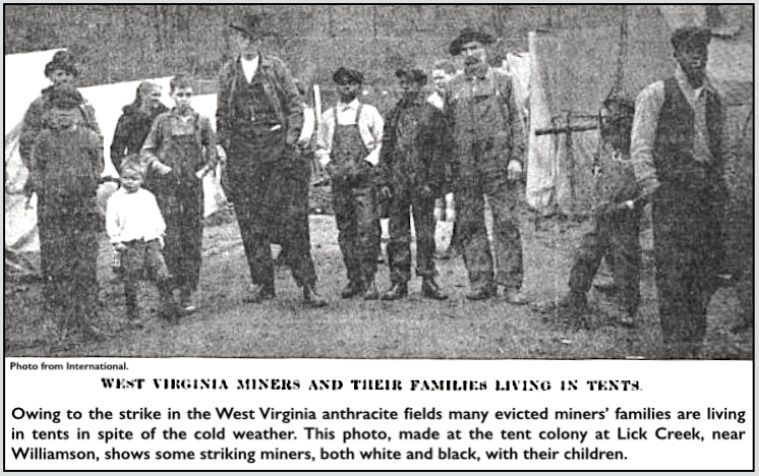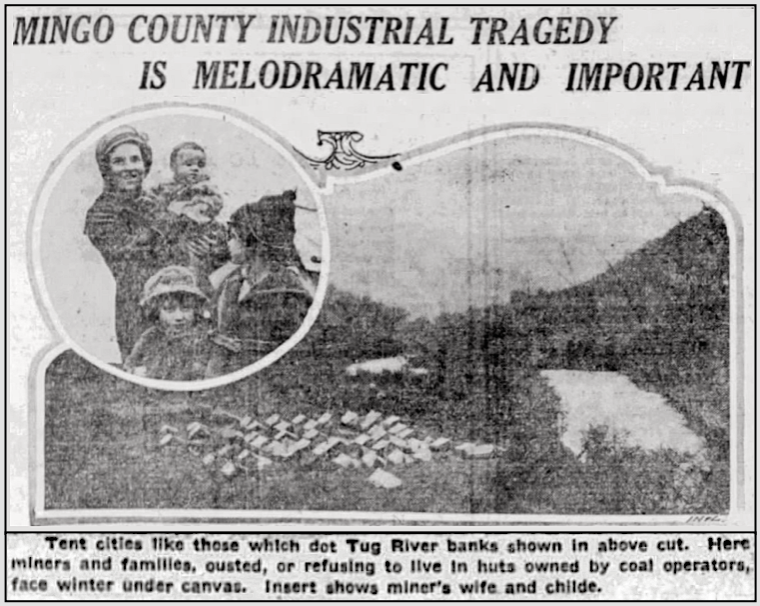 ———-
———-
Hellraisers Journal – Tuesday December 21, 1920
Mingo County, West Virginia – “Civil War Has Become a Fact”
From The Literary Digest of December 18, 1920:
WEST VIRGINIA’S WAR
THE BIGGEST AND BLOODIEST FEUD in the history of West Virginia, say special correspondents on the ground, continues in the vicinity of Williamson, in the bituminous coal-mining district [note: photo above incorrectly states “anthracite field”]. With the private feud on a gigantic scale is combined an industrial war-a strike and lockout. “The issue of the open versus the closed shop is being put to the acid test,” says John J. Leary, Jr., in the New York World, and the scene of the battle between coal-operators and miners is said to be just across the river from the county in which the McCoy-Hatfield feud was waged a generation ago. The strike in the Williamson coal-field began in May with an attempt of the United Mine Workers to unionize the men, we are told by the New York Herald, and the death-toll since that time is thirty-nine. Six hundred men have been wounded. Mine-workers, on one hand, and mine-guards, private detectives, and deputy sheriffs, on the other, have staged a civil war, during which time the estimated loss in production of coal has been 5,000,000 tons and the loss to the miners $3,500,000 in wages, according to the figures of The Herald. Many coal-plants and at least one power-house have been dynamited, declares the New York World, while Mr. Leary continues in that paper:
Murders and killings on both sides have been frequent; hundreds of families have been driven from their poor homes; civil war has become a fact. Back of the mountaineers are the 400,000 union coal-miners of the country. Back of them the sympathy, and, if necessary, the support of the other 3,600,000 members of the American Federation of Labor.
Back of the operators are the open-shop interests. Quietly, but none the less effectively, they are protecting and sustaining the smaller operators who have small resources. They are assisting with advice and with experts in such matters. Likewise they are assisting in Charleston, the capital of the State.
Meantime, the deadlock.
At any time it may flare up again with heavy loss of life on one side or the other, or both.
The fight on the part of the miners to “establish the principle of collective bargaining and to compel recognition by the coal-operators of the union,” in the words of executives of the United Mine Workers, “will receive the moral and financial assistance of the international union representing half a million coal-miners”; the coal-operators, through their association, steadily refuse to recognize the union. West Virginia has no National Guard, points out the Cincinnati Enquirer, and we are told in a New York Times dispatch that a lack of funds with which to pay deputy sheriffs accounts for the failure of county authorities to meet the critical situation.
Federal troops restored and maintained order during September and October, but were withdrawn early in November, only to be recalled by Governor Cornwell, late in the month, when Mingo County, embracing the area of disturbance, was placed under “temporary military control,” which is not quite so severe as martial law. The provisional battalion of 400 regular soldiers, aided by county officers, have collected hundreds of guns and pistols from the opposing forces, say dispatches. “But,” declares another New York Times dispatch, “the differences between the operators and the mine workers appear to be as far from a peaceful settlement as ever.”
President Lewis, of the Mine Workers, declares in a telegram to the New York World that “if Governor Cornwell would enforce the laws of the State and disarm the bands of private gunmen employed by the operators…he would have no need to call for Federal troops,” and he further suggests that the Governor should resign. In his reply, Governor Cornwell says in the New York Times:
“Since the tragedy at Matewan early in May, when a number of the employees of the Felts Detective Agency were killed, no employees of that or any other concern, so far as I know or have been able to find out, have been in the strike region except to pass through on a train or to appear at court in Williamson in answer to summons. If any are in the field they are not guards, but secret operatives. Nor have any other armed guards been employed by the operators so far as I can learn. These things they agreed not to do following the Matewan tragedy. I promised to protect life and property in that region to the best of my ability, and they promised to employ no private guards.”
What has brought all this about, asserts the New York World, “is that private marauders have assumed control, undertaking to settle their differences in defiance of law, and that the State, which should enforce peace upon factions, has shamefully quit the field.” Continues The World:
“Under our system political bankruptcy can not reach more degrading levels. With its whole body of officials incapable, with the mass of its inhabitants destitute of resource, and with no military or constabulary force strong enough to meet rival mobs and subdue them, what claim has West Virginia to consideration as a self-governing State?”
“What claim has New York City to consideration as a self-governing municipality?” counters the Wheeling Register, as it reminds us that “forty murders, with but few arrests,” occurred in New York City during October and November. Says The Register:
“Even Mingo pales at such a high rate of killing. What of the gun mobs prowling the East Side and Bowery regions? Of he bank stick-ups, bank-messenger hold-ups, bomb explosions, they happen to be the agents of partizans on one side or another bond thefts, and hundreds of robberies? What of the political and moral scandals of the great city and the building trust grab?”
“A cheap effort to make political capital out of the Mingo County disturbance, and untruthful in its insinuations,” is the manner in which the World editorial is dismissed by the Wheeling Intelligencer, which then proceeds to clarify the deplorable condition of Mingo County:
“There is no organized revolution in Mingo County. We have there a condition of lawlessness, with which the police forces of the State ought to be able to cope, and which we believe they would be able to handle if they were properly and efficiently directed. West Virginia does not need Federal troops within her borders. She has within her own citizenship power to enforce law and to punish criminals, but law must be enforced with an impartial hand, and criminals, if punished, should be punished because they are criminals and not because they happen to be the agents of partizans on one side or another in an industrial controversy. The fact is, the present situation in Mingo County arose largely because the laws have been continuously broken by men who above all others ought to have set the example of respect for law; because the enforcement of legal processes has been taken in hand by private agencies, and the law administered, not for purposes of justice, manner in which the World editorial is dismissed by the Wheeling but for purposes of partizan and selfish advantage.”
———-
[Emphasis added.]
Note: William Green, Secretary-Treasurer of the United Mine Workers of America, in the lasted edition of the Mine Workers’ Journal, proves that Governor Cornwell knows good and well that company gunthugs continue to terrorize miners’ and their families in Mingo County.
———-
From The Lexington Herald of December 12, 1920:
~~~~~~~~~~~~~~~~~~~~~~
SOURCES & IMAGES
Quote Mother Jones Princeton WV Speech Aug 15, 1920, Steel Speeches, p230
https://books.google.com/books?id=vI-xAAAAIAAJ
The Literary Digest, Volume 67
(New York, New York)
-Oct 1920 to Dec 1920
https://books.google.com/books?id=iBU8AQAAMAAJ
Literary Digest of Dec 18, 1920
https://play.google.com/books/reader?id=iBU8AQAAMAAJ&printsec=frontcover&pg=GBS.RA11-PA7
“West Virginia’s War”
https://play.google.com/books/reader?id=iBU8AQAAMAAJ&printsec=frontcover&pg=GBS.RA11-PA16
The Lexington Herald
(Lexington, Kentucky)
-Dec 12, 1920
https://www.newspapers.com/image/681369604/
See also:
Tag: Mingo County WV
https://weneverforget.org/tag/mingo-county-wv/
From the United Mine Workers Journal of Dec 15, 1920:
“Governor Cornwell Says There Are No Hired Thugs And Gunmen Employed in Williamson Coal Field” -see statement by UMWA Sec-Trea Wm Green strongly disputing Cornwell’s assertion. Green proves that Cornwell knows good and well that company gunthugs are active in Mingo Co.
https://play.google.com/books/reader?id=2hg5AQAAMAAJ&printsec=frontcover&pg=GBS.RA24-PA10
UMWJ – Dec 15, 1920
https://play.google.com/books/reader?id=2hg5AQAAMAAJ&printsec=frontcover&pg=GBS.RA23-PA24
Official Publication of the United Mine Workers of America
(Indianapolis, IN)
https://books.google.com/books?id=2hg5AQAAMAAJ
Note: part of article below describes situation in Bituminous Coal Fields of Mingo County just prior to Battle of Matewan:
The Bottle Maker, Volume 1
(Philadelphia, Pennsylvania)
-July 1921 to June 1922
Glass Bottle Blowers Association
of the United States and Canada
https://books.google.com/books?id=MwdLAQAAMAAJ
The Bottle Maker of October 21, 1921
Pages 3-6: “Facts in Relation to the West Virginia Situation”
https://play.google.com/books/reader?id=MwdLAQAAMAAJ&hl=en&pg=GBS.RA3-PA2
The Federal Bituminous Commission rendered its report on March 10, 1920. It carried with it an award of twenty-four cents flat on pick and machine mining to the bituminous miners of the United States. The coal operators of Mingo County, West Virginia, refused to apply the award, and instead they arbitrarily applied five, ten and fifteen cents on each mine car rate, there being no coal weighed throughout that field. The capacity of these mine cars varies from two to five tons, and the highest rate paid per car was $ 1.40. This price for five tons of coal represented and included all dead work and tonnage rates.
When the award was granted the bituminous miners by the Commission, the miners of Mingo County sent committeemen to the operators and requested that the award be granted in full, and the companies refused it. The miners contended that the award was granted them by their government and that they were going to insist on it. Every plea to the operators was met with refusal, and finally the miners of Sprigg, Stone Mountain and Red Jacket went on strike, called meetings and sent a committee to Charleston to interview the officials of District 17, U. M. W. of A.
They were told plainly by the Miners’ Union that the union would not organize them while they were on strike, to return to work, put all the mines in operation, and then if they desired to become members of the union, they would be given the opportunity.
These instructions were carried out. Again the committees were returned and about eight hundred miners allied themselves with the union at once. Following this the miners flocked into the union and as a result were all discharged and served with eviction notices .
The discontent had become very acute in the month of April, 1920. By this time the Baldwin Felts detectives appeared in Matewan to evict the miners, their wives and children. At this time practically all the miners had joined the union.
[Emphasis added.]
~~~~~~~~~~~~~~~~~~~~~~~~~~~~~~~~~~~~~~~~~~~~~
Fire in the Hole – Hazel Dickens


